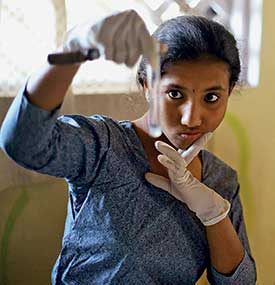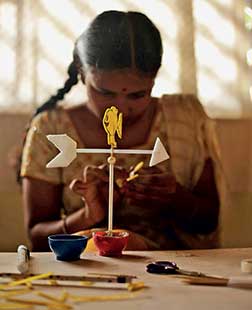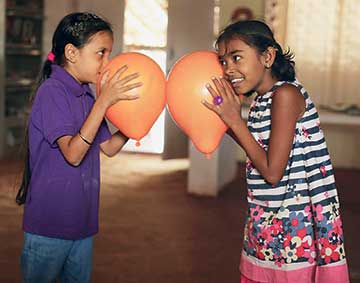Tejasvi Dantuluri
 There is a growing apathy in students towards science. One reason (or misconception) is that it is a tough classroom subject and another is that it is the clever student’s cup of tea. This notion has led to both fear and stress in pupils as they keep encountering the subject at different levels of their education.
There is a growing apathy in students towards science. One reason (or misconception) is that it is a tough classroom subject and another is that it is the clever student’s cup of tea. This notion has led to both fear and stress in pupils as they keep encountering the subject at different levels of their education.
Presenting science education as an attitude, art, and an innate element of our everyday lives rather than limiting it to a classroom subject that compel pupils to memorize the terminologies is the need of the hour.
We can see and also not see; move and also be stationary; we can stand, fall, or even fly. Everything happens for a reason and the reason is science. Science learning should be a simple affair for children because of a simple thought: that they are able to do or see these ideas in their everyday lives. And when they learn to appreciate their actions, see and also understand it as science, children can certainly develop a love for this subject.
Disha Science Centre, located at Tellapur in Hyderabad is an NGO working with a vision to promote science and health awareness. Understanding the need for children to develop a scientific temper, Disha Science Centre, in association with Sunday Science School set the stage in July 2014 to promote science for children. Sunday Science School (SSS) is an institute to advance the concept of learning by doing. It is an institute that facilitates experiential learning, mainly for young brains. Students at SSS learn science as they play rather than from the textbooks and blackboards.
It has been a constant effort by the Sunday School to break the dominant notion of a classroom and the teacher-student relationship. Each student is treated as a young scientist and teachers are considered as their friends or facilitators who help the young scientists in their experiments, thereby creating an atmosphere to observe, explore, and think.
 Experience – the key premise
Experience – the key premise
Students’ responses to the concepts taught in class are heavily dependent on the experiences they bring to the class. Every student listens and interprets the material presented in the class in a different way. For example, every student has some sense that force is necessary in order to maintain velocity when walking, driving, or pushing something along the floor. Newton’s second law is inconsistent with the way that many of our students have made sense of their experiences in their lives. Hence, it becomes important to cater to each student’s understanding of the concepts. This becomes possible only when students are allowed to participate and share their own unique experiences. These then become the premise for discussions which enhances learning.
The institute has borrowed a lot from contemporary pedagogies that are being experimented and has also proved to be successful in disseminating knowledge to young children. It is an inquiry-based experiential science learning for students. Children are given different activities and projects to perform in planned sessions. They understand the underlying scientific concepts with the help of facilitators.
This type of learning occurs when students participate in some activity, reflect upon it, use their analytical skills to derive some insight from the experience, and then incorporate their new understandings into their daily lives.
The SSS programme is designed for students from class III to class IX. The activities are conducted every Sunday for about two hours. The projects and activities are not directly based on any specific syllabus but the topics chosen are very much part of the regular curriculum taught during the school years.
 Hands-on science
Hands-on science
Hands-on learning is the only way students can directly observe and understand science. As students develop effective techniques for observing and testing everything around them, they learn the what, how, when, and why, of things with which they interact.
At SSS, students perform different experiments or build/make the projects guided by the facilitators. All projects and activities are performed by students independently which improve their experimentation skills.
Every Sunday, after completing the activities, facilitators discuss the science of these experiments/projects with students.
For example, in order to learn a concept such as ‘energy’, students make models of solar cars, hydraulic arms, hydro-electric power models, etc. Activities are planned in progressive levels and all students are enrolled for level I in the first year. Students advance to level II in the next year. There are three such levels, which can be taken up in a series.
At each level of the SSS programme, there are usually eight topics related to physics, chemistry, biology, and astronomy in which experiments and projects are planned. Among these eight topics, there are over 50 activities that every participant completes. This includes more than 20 projects, which are displayed during the science fair, an annual event. However, students are encouraged to come up with their own projects and experiments that they would want to perform, display and discuss with their classmates, parents and other science enthusiasts.
Apart from the classroom activity, students are encouraged to participate in healthy discussions on science and its implications in everyday lives. The facilitator’s major responsibility is to encourage students to question and think and this enables them to critically analyze everything around them.
An interesting highlight of the SSS programme is that there is no evaluation of the students’ performance. The objective is to cultivate hands-on experience of science-related subjects while developing a scientific temper in children.
The author works as a coordinator for Disha Science Centre and is a teacher in the Sunday Science School. She can be reached at tejasvi.dantuluri@gmail.com.
